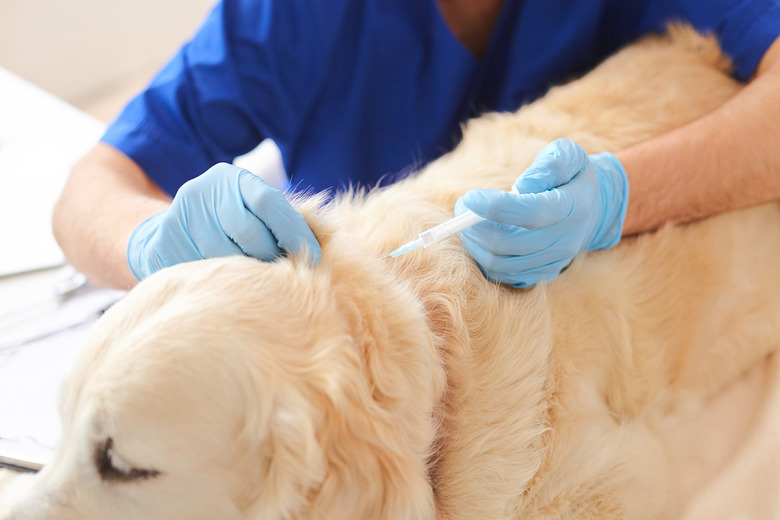Information On Bordetella Vaccination For Dogs
Canine Bordetella vaccinations prevent your dog from catching the highly contagious airborne disease also called "kennel cough." Dogs that are around crowds of other dogs, such as in kennels or at dog parks, should get this non-core vaccination to prevent the potential uncomfortable coughing and secondary infections.
Bordetella Description
Bordetella Description
Bordetella is also referred to as infectious tracheobronchitis. This infection is in the trachea, or windpipe, and the lower respiratory passages, or bronchi. It is an extremely contagious upper respiratory disease that spreads among dogs through the air. The distinctive honking cough is a sign of Bordetella, which is caused by a viral or bacterial infection, or possibly both types of infections. Symptoms are generally mild and last seven to 10 days; but if your dog also has a viral infection, this time period can extend to three weeks or longer. Dogs diagnosed with Bordetella are prescribed antibiotics to the clear the bacteria from the system. A dog may also receive a cough suppressant for relief of the uncomfortable cough.
Non-Core Vaccination
Non-Core Vaccination
Bordetella vaccinations are not needed by all dogs, which is why it isn't a core vaccine. If your dog attends doggy daycare, goes to the dog park or groomer or is staying at a kennel while you are out of town, he should have this vaccine. The vaccine should be given a minimum of four or five days before your dog enters a kennel or goes to a groomer, and you will need proof of his vaccination. This vaccination is available as an injection or in an intranasal form.
Intranasal Vaccine
Intranasal Vaccine
Puppies as young as three weeks old can receive the intranasal vaccine for Bordetella. The immunity lasts about 12 months. A solid immune response can be expected four days after the vaccine is administered. Some intranasal Bordetella vaccines include Parainfluenza and Adenovirus vaccines as well.
Injectable Vaccine
Injectable Vaccine
Puppies can have a Bordetella vaccine through injection after 4 months of age. Two doses are needed about one month apart to build up immunity. Boosters are usually given annually.
Tip
Kennels and groomers will often require booster shots every six months instead of 12 to ensure that your dog is free from Bordetella. Check with your facility to be sure.
Vaccination Side Effects
Vaccination Side Effects
The Bordetella vaccination is very safe and has few side effects. Rarely, a dog may have fever, nausea or generally feel unwell after the vaccine. More commonly, a dog may experience occasional sneezing or coughing for a few hours after vaccination.
Always check with your veterinarian before changing your pet's diet, medication, or physical activity routines. This information is not a substitute for a vet's opinion.
